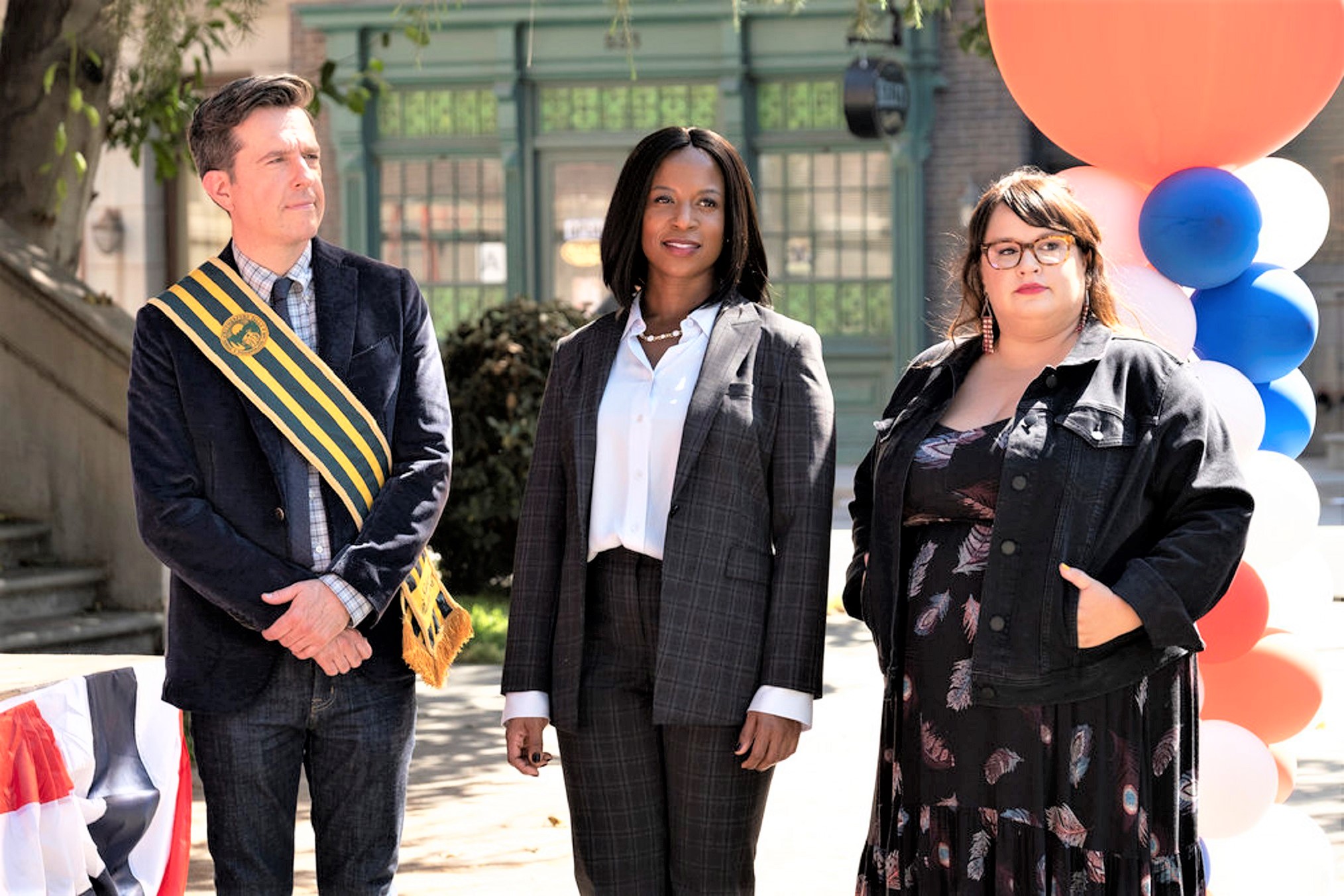The streaming service Peacock has made a distinct use out of its renowned hit, “The Office”—subscription fees used to be determined by the access one desires to show. It’s the other NBC sitcom from that era, “Parks and Recreation,” that feels next on the repurposing list, as that series certainly rings throughout the new sitcom “Rutherford Falls.” The show, co-created by Michael Schur of “Parks” along with Ed Helms and Sierra Teller Ornelas, does away with the mockumentary style but feels like it could exist in the same universe as the town of Pawnee and its fearless leader Leslie Knope, while carrying much of the same progressive spirit. And like some of the best episodes of “Parks,” “Rutherford Falls” tries to offer a more honest look at a town’s history, one that includes the history of colonization that itself was then whitewashed in the public narrative. The “Parks”-like vibe almost feels like a Trojan horse from the show (and its five Native writers on staff) to show viewers how wrong popular American history has been. Don’t let the smile fool you, “Rutherford Falls” is gritting its teeth.
Here is a series with has an incredibly strong concept, especially for a story that also proves to be a workplace comedy of sorts where everyone mostly likes each other despite their clashing goals. It’s more that in its first four episodes, “Rutherford Falls” can be underwhelming with the comedy that usually takes a saga like this over the top. The series doesn’t have much of its own comedic signature, even though it has plenty of compelling ideas.

The relationship between the Minishonka people (a fictional tribe) and the colonizers back in the 1700s is reflected centuries later with the friendship between Reagan (Jana Schmieding) and Nathan (Ed Helms). She has a small cultural space inside a casino, where her displays of valuable tribal artifacts are confused for souvenirs. Meanwhile Nathan is shown leading tours and offering reenactments at a lavish museum dedicated to the Rutherford’s legacy, just one indication of how his ancestors flourished. The legacy has become his pride and joy, and his stasis makes him all the more possessive of the land, statues, and general power behind the Rutherford name. “This isn’t a great time for statues,” he’s told by Mayor Deidre Chisenhall (Dana L. Wilson), and it goes right over Nathan’s head.
Throughout the process, Reagan and Nathan remain friends who support of each other. That bond is one of the show’s many wholesome, kind touches, in its way of cleverly, openly recognizing the reality of colonization by making such a messy subject a part of their unique dynamic. Nathan encourages Reagan on trying to get a larger cultural center, and Reagan sometimes works at Nathan’s Rutherford shrine. But things start to fray in the town when Nathan gets indignant about a Rutherford statue’s possible removal—known to him as “Big Larry,” the hulking tribute is located in the middle of the street to comedic effect. He makes a big public speech about how people do not respect the history behind the statue, completely unaware of how tone-deaf he sounds. The first episode ends with Terry (Michael Greyeyes), who runs the casino, and his fellow Native board members deciding to sue the Rutherford family, entering a small history of tribes that have sued cities.
Schmieding’s Reagan is a relatively Leslie Knope-like foundation for this series, with her know-it-all nature that in turn alienates her from the town’s kookier other characters, a type of dedicated intellectual that’s treated as an outsider due to something from her past. But Schmieding makes the role constructs her own, especially in Reagan trying to achieve her goal of getting that new cultural center. She provides the charisma and at times clumsy charm that makes you wish the plotting gave her more to work with—the first four episodes seem more focused on how she reacts with others, be it Nathan or a handsome reporter played by Dustin Milligan.
Other sizable chunks of the show’s focus are given to Helms’ Nathan. To Helms’ credit, for the most part he puts an amicable face on white privilege, while his general naïveté is played off as an extension of his dorkiness, despite its serious connotations. The character doesn’t read well on paper, which is a credit to the show’s lightly serious tone that he’s not too tiresome; Helms is one of the best in the business at playing someone who is so, so very close to “getting it,” and yet he does not (he does similar work in this week’s “Together Together,” as a man who befriends the surrogate who will birth his child). Nathan’s sincere empathy for others creates an interesting tension with his degree of denial, especially when it comes his family’s role as colonizers. But there are times when the show leans too readily into Helms’ generic-go-lucky style, making his character-driven moments generally predictable.

The show’s standout performance is from Michael Greyeyes, who plays a character that Reagan refers to as a shark. Greyeyes knows how to make his character Terry so tempting, so approachable, so larger than life. Greyeyes gives the most fascinating performance here, as someone who shows how performative he can be with his position of power, leading a casino with Native employees and board members that is very much in the business of working white people. Greyeyes’ shifts in demeanor, depending on what he can get out of who he is talking to, are both visible and subtle enough to suggest a stunning sense of control and self-awareness. The series’ fourth episode offers more in-depth look at this character, and his bitter capitalist backstory, but it also shows how his roles as a father and husband can create levity, and that he also fits in this story as a goofy, overbearing dad trying to pressure his daughter to make money with her beads. Greyeyes offers the type of performance that could lead and sustain its own complex series, and one that could either be a sitcom or something like “Breaking Bad.”
Outside of these three, the show does not yet have the cumulative strength that makes a “Parks and Recreation”-like ensemble work. Part of that is in how the show is still developing four episodes in, and finding out which characters are the most watchable. (I’m hoping for more from the two employees at the casino who are not impressed by Reagan, and for more clever jokes for Jessie Leigh’s Bobbie, Nathan’s assistant.) But the jokes that are in play here aren’t all that effective, whether it’s about Nathan’s naïveté or Reagan’s intensity, or some pop culture ad lib joke (“Cloud Atlas,” The Avengers, and even “Parasite” are all name-dropped to mild groans). The humor leaves a noticeable gap in between the series’ more thoughtful passages, and it’s lack of creativity flattens episode arcs that throw in characters to inspire Reagan or Nathan to see the extreme potential of their goals. Paul F. Tompkins, for example, relishes his role as a non-PC Rutherford historian with a drinking problem, but the jokes read off as too easy. With the show’s main storyline of the lawsuit barely developing across four episodes, the comedy does not give enough momentum in its place.
But as any fan will tell you, “Parks and Recreation” didn’t really take off, or find its comedic voice, until about one season in. I suspect that could very well be the case with “Rutherford Falls”—it has a good deal more to prove of itself, but it does have compelling leads and the promise of a strong premise, one that hooks you with a necessary wake-up call.
Four episodes screened for review. “Rutherford Falls” premieres on Peacock on April 22.












